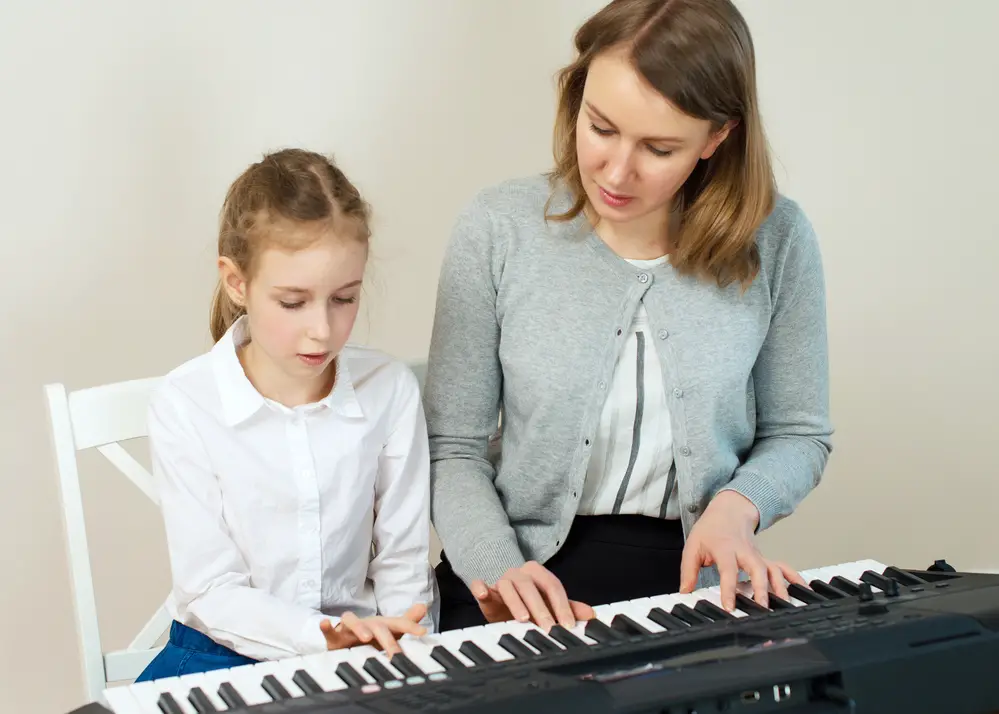
If you’re a parent, maybe you’ve wondered, “Should my child learn the piano?” or “What age to start piano lessons?”
It can be hard to understand the benefits of playing the piano, especially if you haven’t played it yourself.
But, if you’re a pianist and parent, you might already want to get your child involved with the piano. Out of good reason, too.
Playing the piano as a child has hidden benefits that many people don’t even realize.
With a little time and effort, your child could be flourishing from these benefits. This process isn’t as hard as you may think.
In this article, I’ll discuss why children should learn the piano and how to get your child started.
Let’s dive right in.
Table Of Contents Why Should Children Learn Piano?Teaches Good Focus, Drive, and Work EthicEnhances Reading, Listening, and Speech SkillsImproves Mood and Ability to Feel EmotionsBuilds ConfidenceIt’s a Highly Admirable Skill!Different Lesson Types For Different Age GroupsWhat Age is Best For Children To Start Learning Piano?Signs That a Child is ReadyWhat is the Best Age to Start Piano Lessons?Wrapping Up
Why Should Children Learn Piano?

Have you ever heard someone say, “I wish I could play the piano!” or “I took some lessons, but I stopped.” I’ve heard this countless times from people that couldn’t quite make it over the hill. On the other hand, some people didn’t get the opportunity at all.
Teaches Good Focus, Drive, and Work Ethic
Taking time to practice the piano each day isn’t the easiest task. It takes focus and discipline to practice scales and techniques. However, this type of practice doesn’t go to nothing.
Children can start playing their favorite songs on the piano for their own and others’ enjoyment. Also, children who practice discipline and perseverance tend to be more intelligent and successful in their lives.
The more we challenge our children with growth opportunities, the more likely they’ll persist in life’s other challenges. Whether it’s learning the piano or studying for a test, your kid’s concentration and focus are qualities that are highly beneficial in the long run.
Enhances Reading, Listening, and Speech Skills
That’s a pretty powerful lineup. Music is another language that helps kids’ brains in countless ways. When your child learns to play the piano, they’re introduced to sheet music. Like reading a book, sheet music goes from left to right. The focus it takes to read sheet music can positively impact your kid’s normal reading abilities. As for listening and speech skills, studies have shown that playing the piano can dramatically increase these as well.
Improves Mood and Ability to Feel Emotions
Music is a powerful vehicle for emotions of all kinds. When kids learn the piano, in a way, they’re studying different emotions. Each song has subtle feelings hidden that only the pianist can understand. Playing music by other composers opens up the world of emotions that each piece portrays. This advanced exposure to feelings can give children more empathy and brighten their mood.
Builds Confidence
Playing the piano in front of people takes guts. When people play in front of others, it’s common for them to be nervous. These nerves aren’t all bad, though. If you’re a parent, you probably know that sometimes, growth takes pushing yourself, which is what children have to do to play in front of others.
After a few performances, they may not even feel as nervous as before. That is the first-hand sign of increased confidence, which children can take with them for the rest of their lives.
It’s a Highly Admirable Skill!
Playing the piano feels incredible. When a child knows a song really well, it’s embedded into their muscle memory. So, in a way, they can just sit back and listen as their fingers play beautiful melodies right in front of them. Also, playing the piano is a great way to bring joy to others around you. Pianists often hear things like, “You play the piano? That’s so cool!” Overall, it’s a sought-after skill that many people wish they could have.
Different Lesson Types For Different Age Groups

There are different learning methods for different age groups. Children who are 6-8 years old may learn differently than ones 10-11. These ages comprise different stages in mental development and call for different lesson types.
For children aged 4-8, strict and formal piano lessons aren’t the most ideal. At this age, you want to get your child excited about learning the piano. Piano teachers that go through one concept at a time in an interesting fashion are the best fit. There shouldn’t be any pressure on children to perform at this age, because it could turn them away. Teachers will also let the child set the lesson pace. That’s the best way for kids to stay excited about learning.
Children in the 9-13 age range may be able to handle slightly more intense training. At this age, the teacher may start setting more goals for kids and have a progress plan. This is also an excellent age for kids to start using more sheet music.
For teens aged 14-18, teachers may use more advanced sheet music. They will also build on basic techniques by demonstrating more intricate body and hand movements. Kids at this age may be developing their own music tastes, so a high-quality teacher might help them learn their favorite songs.
What Age is Best For Children To Start Learning Piano?

You’ve probably heard of prodigies who started playing when they were 3 years old. However, those children often grow up to become famous musicians and concert pianists. If you want to get your child into piano lessons, the best age is anywhere from 6-8 years old. At this time in a kid’s life, they’ve already gone through a year of kindergarten. In other words, they’ve already received teaching from an adult.
Children at this age have the prime mental capacity to learn complex music with ease. Some research shows that 9 and 10-year-olds may not be able to pick up the language of music as quickly as 8-year-olds.
On top of that, younger children have more time to practice. As they get older, things like sports and school can get in the way. Children who start playing the instrument earlier are more likely to stick with it later on.
Signs That a Child is Ready
There are a few factors that determine whether a child is ready to take on this craft or not.
- Hand size
- Interest in music
- Finger mobility
Playing the piano, you need big enough hands. How big, exactly? Well, there’s a test. If a child can put all 5 fingers on 5 adjacent white keys, they may have large enough hands. However, if they can’t, you should probably wait until they’re a little older, in most cases.
Has your child ever shown interest in music? If so, that could be a sure sign that they’re ready to blossom with lessons. A child with early music interest is more likely to develop a passion for playing.
Since playing the piano involves every finger, you should see if your child can independently wiggle each finger. It’s challenging and painstaking for a child to learn piano if they don’t yet have full finger mobility.
What is the Best Age to Start Piano Lessons?
Wrapping Up
Children who learn to play the piano reap countless benefits that can stay with them their whole life. If you’ve ever wondered, “Should my child take piano lessons?” You’re not alone. But, countless children don’t get the opportunity to try out this valuable craft. Even children over the age of 8 can tremendously gain from this experience. It’s never too late for your child to pick up this invaluable skill.

